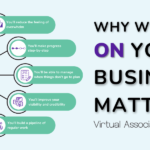Technology has become part of our day-to-day lives; we use it to communicate with our friends and family and to keep connected with our colleagues and clients at work. New technologies, software and applications are being developed all of the time, with some of the world’s biggest brands leading the way when it comes to advancements and innovation – think Amazon, Google and Tesla.
There is a particular interest in VR, robotics and artificial intelligence right now, and it’s impressive to see the developments that have been made in these areas over the last few months alone. In May, the world’s first all-VR theme park opened in China, featuring 35 attractions. The same month also saw MIT engineers launch the world’s first robotic kitchen restaurant in Boston.
Smaller businesses should take inspiration from what others are doing, and be keen to become early adopters of technology themselves. As the co-founder of a business that was one of the first to specialise in unified communications, it’s imperative that we continue to invest in our offering and stay ahead of the curve to maintain a competitive edge.
I recently had the pleasure of interviewing other early adopters of technology, including one business that claims to be among the first to make use of a website back in 1995! Others have adapted to our ever-changing society by putting time and money into chatbots, VR and cloud technology.
This article will explore some of the benefits of becoming a trendsetter and how technology can help to transform your own company.
Improve your offering
Investing in new and emerging technologies can help improve your business operations and business offering. Let me give you a real-life example of this – Cruise1st, one of the companies I interviewed, recently adopted a chatbot as a means of handling customer enquiries through machine learning technology.
The benefits are two-fold. Firstly, the chatbot improves user experience by assisting customers during the research phase, helping them to find a destination, cruise line and deal that they’re interested in. The always-on nature of the programme also means that customers can get help 24/7, with the chatbot capable of handling hundreds of queries and conversations simultaneously. The secondary benefit is that it improves Cruise1st’s operations by freeing up resource in its call centre.
The firm’s global head of digital and eCommerce, Simon Hoe, explained: “Given the volume of research that goes into planning a cruise, we needed a new process to
filter out ‘tyre-kicking’ customers and free up resource in our call centre. Too often, our
agents were handling general enquiries from customers with minimal purchase intent, so
we wanted to be able to filter our calls to move customers at a deeper stage of the
sales funnel to the front of the queue”.
There’s been a financial benefit too – AI adoption has resulted in an eight-fold increase in lead capture, 3% revenue growth and nearly 50% increase in profit per basket.
Simon said the firm has also invested in virtual reality as part of its physical sales efforts at its Manchester store. He added: “Having seen the effectiveness of our new chatbot system, machine learning is something we’re keen to explore further and adapt to other areas of the business, such as the payment portal and post-booking phase”.
Stay ahead of the competition
As an entrepreneur, you’ll be aware of the importance of maintaining a competitive edge. Technology can ensure you don’t get left behind. Though not a ‘new technology’ as such, we can’t forget the impact the World Wide Web has had on….well, pretty much everything (since its introduction in 1991).
In 1995, when the internet was still in its infancy, Peter Noble, director of music entertainment PR agency Noble PR, created a company website in order to stay one step ahead. The site was mainly used for displaying its press releases and for marketing purposes. Peter said: “It was a radical move. Most people did not have access to the internet and, of those who did, it was via a dial-up connection which was very slow and unstable. Press releases were mainly distributed either by fax or via the post. Either way was slow – faxes often got lost and it would take days for a press release to arrive by post, and often the recipient was not there to receive it.
“I could see that the internet would help solve this problem, although my staff really did think I’d gone nuts. They didn’t know if the internet would be adopted by the mainstream so, to them, it seemed a luxury to have a website”.
Technology can not only help you secure more business, but better talent too. Cloud experts, IT professionals and trusted advisors, Risc IT Solutions, has invested in a hosted Skype for Business platform which enables it to communicate more effectively (both internally and externally) through its instant messaging, phone and video call capabilities.
“Our phone system was ageing, and we needed more flexibility in our work environment,” business development director Mark Lawton explained. “The platform means we aren’t tied down to the desks in our office. We can work from anywhere, at any time”.
Flexible working is growing in popularity and is seen as a very desirable workplace benefit. Studies show that having such a policy in place makes a business more appealing, with almost one in three valuing additional holiday allowance and flexible working over a pay rise!
Get inspired to create something new
Keeping on top of what other companies are doing can be inspirational for any small business. Equally, inspiration may come as a result of a societal change (i.e. a new law or initiative) or through the identification of a common problem, for which there is not yet a solution. One of the companies I spoke to, SimpleTax, created a new piece of software on the back of the Government’s announcement of Making Tax Digital. SimpleTax claims to have the first software that “completes and submits a tax return from any device”.
The firm’s director and strategic partnership specialist Amanda Swales said: “GoSimpleTax allows taxpayers to simply complete their tax return. The application runs in the cloud and is accessible through any internet browser. Apps are available in both the Apple and Google stores, meaning you can record income/expense on the move, or even fully complete your tax return on your phone”.
The software also uses AI to suggest tax allowances that might have been missed and to guide the user through to successful submission.
Amanda is keen to keep an eye on developments in her industry and believes that the use of artificial intelligence will become more and more prominent. She added: “As for interaction with HMRC I believe that customers will communicate via intelligent bots, rather than directly speaking to someone. You can already see this in its current infancy with over 170,000 HMRC customers using a range of digital tools to communicate including webchats, tweets, Facebook posts and the Messenger Bot by August last year”.
By Alex Tebbs, co-founder of unified communications specialist VIA







